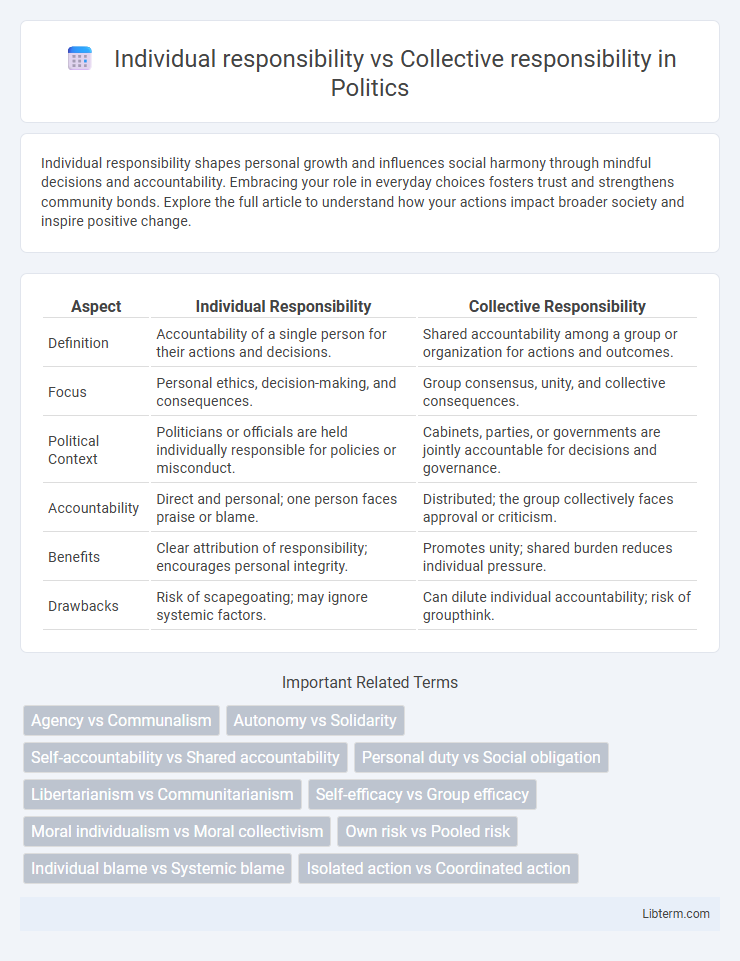Individual responsibility shapes personal growth and influences social harmony through mindful decisions and accountability. Embracing your role in everyday choices fosters trust and strengthens community bonds. Explore the full article to understand how your actions impact broader society and inspire positive change.
Table of Comparison
| Aspect | Individual Responsibility | Collective Responsibility |
|---|---|---|
| Definition | Accountability of a single person for their actions and decisions. | Shared accountability among a group or organization for actions and outcomes. |
| Focus | Personal ethics, decision-making, and consequences. | Group consensus, unity, and collective consequences. |
| Political Context | Politicians or officials are held individually responsible for policies or misconduct. | Cabinets, parties, or governments are jointly accountable for decisions and governance. |
| Accountability | Direct and personal; one person faces praise or blame. | Distributed; the group collectively faces approval or criticism. |
| Benefits | Clear attribution of responsibility; encourages personal integrity. | Promotes unity; shared burden reduces individual pressure. |
| Drawbacks | Risk of scapegoating; may ignore systemic factors. | Can dilute individual accountability; risk of groupthink. |
Understanding Individual Responsibility
Individual responsibility involves accountability for one's actions, emphasizing personal decision-making and ethical conduct. It requires self-awareness and the ability to recognize the consequences of choices on oneself and others. Understanding individual responsibility is crucial for fostering autonomy, integrity, and moral development within social and professional contexts.
Defining Collective Responsibility
Collective responsibility refers to the accountability shared by all members of a group for the actions, decisions, or outcomes resulting from their collective efforts. It emphasizes the interconnectedness of individuals within a community, organization, or society, highlighting that successes and failures are borne jointly rather than by isolated individuals. This concept is foundational in political bodies, corporate governance, and social movements, where collective accountability ensures unified commitment and ethical standards across the group.
Key Differences Between Individual and Collective Responsibility
Individual responsibility emphasizes personal accountability for actions and decisions, highlighting self-control and moral obligations unique to the individual. Collective responsibility involves shared accountability among group members, where outcomes and duties are distributed across a community, organization, or society. Key differences lie in the scope of liability--individual responsibility centers on personal consequences, while collective responsibility addresses group consequences and cooperative obligations.
Historical Perspectives on Responsibility
Historical perspectives on responsibility reveal a complex interplay between individual accountability and collective obligation, with ancient legal codes like Hammurabi's emphasizing personal culpability while communal societies prioritized group liability for social harmony. In the Enlightenment era, philosophers such as John Locke advanced the concept of individual rights and responsibilities, influencing modern democratic principles that balance personal freedom with social duties. Shifts in historical contexts demonstrate that cultures oscillate between these orientations, reflecting evolving notions of justice, governance, and ethical responsibility.
The Role of Ethics in Responsibility
Ethics plays a crucial role in defining the balance between individual responsibility and collective responsibility by establishing moral principles that guide decision-making and accountability. Individual responsibility emphasizes personal accountability based on ethical standards, while collective responsibility involves shared duties within groups or organizations to uphold ethical practices. Clear ethical frameworks ensure that both personal actions and group behaviors contribute to social trust and moral integrity.
Impact on Society: Individual vs Collective Approaches
Individual responsibility fosters personal accountability and ethical behavior, driving societal progress through proactive citizenship and informed decision-making. Collective responsibility emphasizes shared accountability, promoting social cohesion by addressing systemic issues and enabling coordinated efforts for community welfare. Both approaches shape society by balancing personal initiative with cooperative solutions to complex social challenges.
Case Studies: Real-world Examples
In the 1980s Bhopal disaster, individual negligence by Union Carbide executives contrasted starkly with the collective responsibility of government agencies and local communities in managing the aftermath and ensuring safety reforms. The 2008 financial crisis revealed how personal accountability of key bankers intersected with systemic failures, emphasizing the need for collective oversight by regulatory bodies and institutions. In public health, the COVID-19 pandemic showcased individual actions such as mask-wearing while underscoring the collective responsibility of governments and societies to coordinate vaccination and containment efforts.
Challenges and Controversies
Individual responsibility often faces challenges related to personal accountability in complex systems where outcomes depend on collective actions, making it difficult to isolate single contributions. Collective responsibility raises controversies around fairness and the potential for scapegoating, as entire groups may be held accountable for actions of a few members. Balancing these responsibilities requires navigating ethical dilemmas, legal frameworks, and social norms that influence perceptions of guilt and duty.
Striking a Balance: Integrating Both Concepts
Striking a balance between individual responsibility and collective responsibility requires recognizing that personal accountability drives ethical behavior and self-improvement, while collective responsibility fosters social cohesion and shared goals. Effective integration occurs when individuals take ownership of their actions within a community framework that promotes mutual support and collective problem-solving. This synergy enhances sustainable development, social justice, and organizational success by aligning personal initiatives with broader societal needs.
Future Implications and Societal Trends
Individual responsibility drives personal accountability and innovation, shaping future societal norms through proactive behaviors and ethical decision-making. Collective responsibility fosters community resilience and social cohesion, essential for addressing global challenges such as climate change and public health crises. Emerging societal trends emphasize a balanced integration of both, leveraging technology and policy to enhance cooperative efforts while maintaining personal agency.
Individual responsibility Infographic

 libterm.com
libterm.com